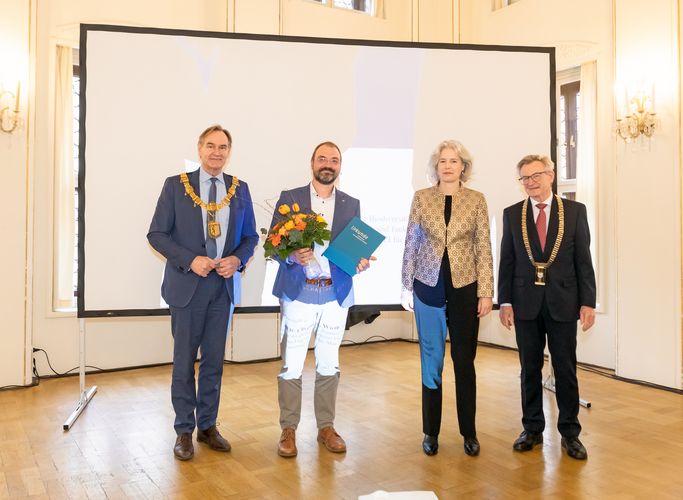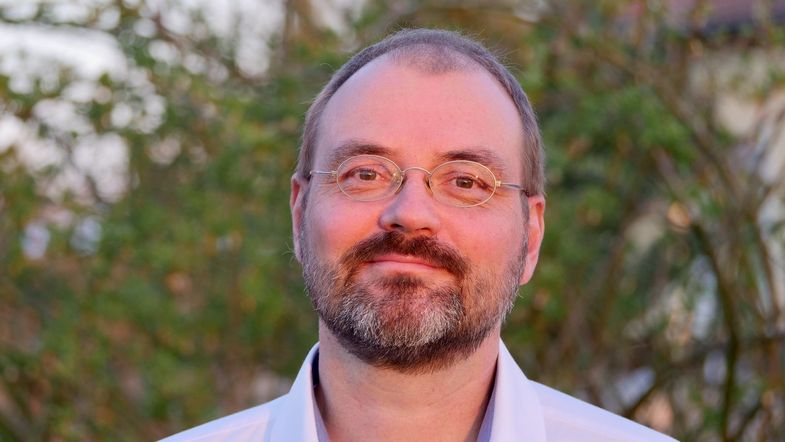The prize – which is awarded regularly by the City of Leipzig, Leipzig University and the Saxon Academy of Sciences and Humanities in Leipzig – honours research that meets the highest academic standards and reinforces Leipzig’s reputation as a city of science and research with a nationally and internationally recognised research and education landscape. Leipzig’s Mayor Burkhard Jung said, “With Professor Wirth, this year we are honouring an outstanding scientist who embodies the purpose of the Leipzig Science and Humanities Award in the best sense. As a speaker for the German Centre for Integrative Biodiversity Research, Christian Wirth has established a beacon of excellence in science in our city that carries Leipzig's reputation as a city of science and research out into the world and at the same time attracts many bright minds to Leipzig. Whether through the iDiv, the Botanical Garden or the Leipzig Canopy Crane, Professor Wirth has also succeeded in effectively communicating research on biological diversity to our urban society and getting many people excited about this highly relevant subject.”
“As always, the jury of the Leipzig Science and Humanities Award 2022 had the particularly rewarding but difficult task of choosing a winner from the many high-calibre proposals submitted. This year, we are honouring a scientist who has made a great contribution not only in Leipzig but also globally with his pioneering research in the field of biodiversity and as such an important contribution to greater sustainability and nature conservation,” said Professor Hans Wiesmeth, president of the Saxon Academy of Sciences and Humanities in Leipzig.
Professor Beate Schücking, Rector of Leipzig University (until 31 March 2022 added, “We honour Professor Wirth for his outstanding achievements in the field of integrative biodiversity research. Thanks to his commitment to science, he has helped shape this new research discipline in a visionary way. Professor Wirth has earned a reputation as the world’s leading scientist in the field of biodiversity. The publications produced by the Intergovernmental Panel on Climate Change and the World Biodiversity Council as well as the negotiations at the World Climate Conference in Glasgow (COP26) show the importance of his scientific work. In addition, Professor Christian Wirth’s international reputation only increases Leipzig’s reputation as a city of science and research.”
Background information
Leipzig Science and Humanities Prize
Leipzig is a city of science and research with a nationally and internationally recognised research and education landscape The Leipzig Science and Humanities Prize is intended to document this publicly by awarding prizes to research that meets the highest academic standards and reinforces Leipzig’s reputation as a city of science and research. The prize is awarded by the City of Leipzig, Leipzig University and the Saxon Academy of Sciences and Humanities in Leipzig. The prize money comes to €10,000.
A jury of nine researchers selects the prize recipients. The members of the jury serve on a voluntary basis and have a term of four years. The jury for the Leipzig Science and Humanities Award 2022 included the following members:
- Professor Gerald Fauth, Rector of the University of Music and Theatre “Felix Mendelssohn Bartholdy” Leipzig
- Professor Wolfgang Huschner, Vice President of the Saxon Academy of Sciences and Humanities in Leipzig
- Professor Jörg Kärger, Leipzig University
- Dr Torsten Loschke, Head of the Department for Knowledge Policy for the City of Leipzig
- Professor Svante Pääbo, Director at the Max Planck Institute for Evolutionary Anthropology
- Professor Beate Schücking, Rector of Leipzig University (until 31 March 2022)
- Professor Georg Teutsch, Scientific Managing Director at the Helmholtz Centre for Environmental Research Leipzig (UFZ)
- Professor Hans Wiesmeth, President of the Saxon Academy of Sciences and Humanities in Leipzig
Previous recipients of the Leipzig Science and Humanities Prize:
-
2001: National Atlas of the Federal Republic of Germany produced by the Institute for Regional Geography Leipzig Now called: Leibniz Institute for Regional Geography (IfL)
- 2003: Professor Svante Pääbo, Max Planck Institute for Evolutionary Anthropology
- 2006: Professor Jürgen Haase, Leibniz Institute for Solid State and Materials Research Dresden (IFW) Now: Dean of the Faculty of Physics and Earth Sciences at Leipzig University
- 2009: Professor Frank Zöllner, Leipzig University, Institute of Art History
- 2011: Professor Marius Grundmann, Leipzig University, Institute of Experimental Physics II
- 2013: Professor Dan Diner, Hebrew University of Jerusalem, previously at the Simon Dubnow Institute for Jewish History and Culture at Leipzig University Now called: Leibniz Institute for Jewish History and Culture – Simon Dubnow (DI)
- 2016: Professor Annette G. Beck-Sickinger, professor for bioorganic chemistry and biochemistry at Leipzig University and Professor Manfred Rudersdorf, professor for history of the early modern period at Leipzig University
- 2019: Professor Evamarie Hey-Hawkins, professor for anorganic chemistry at Leipzig University and Professor Frank-Dieter Kopinke, Head of the Department of Environmental Engineering at the Helmholtz Centre for Environmental Research (UFZ)
Prize winner 2022
Prof. Dr. Christian Wirth – Vita
Christian Wirth, born in Tripoli, Libya, in 1969, studied biology at the University of Bayreuth starting in 1990 and completed his doctorate with a summa cum laude in May 2000. After working as a postdoc at the Max Planck Institute for Biogeochemistry in Jena (2000–2003), he accepted a postdoc position at Princeton University in the US (2003–2005, with a research fellowship from the German Research Foundation). During this period, he spent time at the Sukachev Institute of Forest Research in the Russian Academy of Sciences in Krasnoyarsk, Russia, and at the University of Fairbanks in Alaska (2003–2004). He then returned to Jena to head up an independent junior research group at the Max Planck Institute for Biogeochemistry (2005–2009). In November 2009, Christian Wirth was appointed professor for special botany and functional biodiversity at the Institute of Biology at Leipzig University and at the same time Director of Leipzig University’s Botanical Garden. In October 2012, he served as founding director of the German Centre for Integrative Biodiversity Research (iDiv) Halle-Jena-Leipzig, for whom he has been a speaker since 2019. Since 2012, Professor Wirth has also been a Max Planck fellow at the Max Planck Institute for Biogeochemistry in Jena.
His research focuses on biodiversity and ecosystem functions, specifically the functional diversity of forest trees and forests, as well as the link between population ecology and biogeochemistry. In his time at Leipzig University, Professor Wirth has published around 205 journal articles. He is therefore one of the most productive and influential researchers at Leipzig University and internationally.
Nine years after its establishment, the German Centre for Integrative Biodiversity Research (iDiv) is an internationally recognised beacon of biodiversity research and has established a new field of research. An essential part of Professor Wirth’s research involves networking with other disciplines. Thanks to this integrative approach, he has inspired and developed new synergies at the Leipzig site, in Germany and worldwide.
In Leipzig, Professor Wirth leads the Leipzig Canopy Crane (LCC) research facility, where he works closely with scientists in chemical ecology on questions related to plant defence mechanisms. He is also significantly involved in globally renowned collaborative projects on biodiversity funded by the German Research Foundation (DFG). Since 2021, Professor Wirth has led the Fact Check Biodiversity project, which has received €3 million in funding from the Federal Ministry of Education and Research (BMBF). For this project, around 100 representatives from universities, government agencies, and associations are working together to develop a national assessment for the preservation of biodiversity.
Furthermore, Professor Wirth has shaped the field of biodiversity research in a variety of capacities. For example, he is a member of the German Research Foundation’s Permanent Senate Commission on Fundamental Issues of Biological Diversity, represents the subject of biodiversity as a fellow in the Max Planck Society and serves as a reviewer for the Council of Science and Humanities. In addition, he is a founding member of the BMBF’s flagship initiative for biodiversity conservation and an adviser for the establishment of the National Monitoring Centre for Biodiversity (NMZB). Professor Wirth regularly advises the City of Leipzig and Saxon Forestry Offices on environmental issues and in 2020 was appointed by the Minister of the Environment of the Free State of Saxony as a scientific expert to a working group on the future of the Leipzig floodplain forest.































































